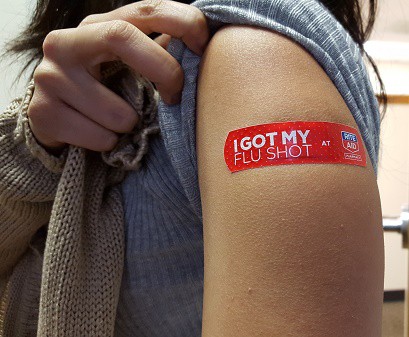
 Scientists are close to producing a universal flu vaccine, as another step toward the goal was recently taken by researchers at McMaster University in Hamilton, Ontario, in conjunction with the Icahn School of Medicine at Mount Sinai, New York, and the University of Chicago.
Scientists are close to producing a universal flu vaccine, as another step toward the goal was recently taken by researchers at McMaster University in Hamilton, Ontario, in conjunction with the Icahn School of Medicine at Mount Sinai, New York, and the University of Chicago.
Every year around this time, millions of North Americans line up to get their annual flu shot, a practice roundly recommended by health professionals as a key component in protecting oneself against contracting the influenza virus which kills an estimated 250,000 to 500,000 people worldwide every year. In Canada, over the past five years, total hospitalizations due to the flu averaged about 5,000 per year and total deaths averaged 320 deaths per year.
But the effectiveness of the shot depends centrally on the match between the virus strains in the administered vaccine and the particular strain predominant in society at any given time. Scientists constantly work to connect the two, sometimes with success and sometimes not. This past year, for example, the flu vaccine was found to have cut the risk of contracting the flu by 45 to 50 per cent – a fair result, due to the vaccine being well matched with H1N1, the predominant strain for 2015-2016. But for the previous flu season in 2014-15, the vaccine did not match up with that year’s H3N2 virus, which meant the flu shot offered virtually no protection that year.
“The current seasonal vaccines only work when we predict correctly what strains are going to circulate,” says Matthew Miller, assistant professor of biochemistry and biomedical sciences at McMaster’s Michael G. DeGroote School of Medicine and senior author of the new study, in conversation with the Hamilton Spectator. “Seasonal vaccines have to be administered annually. It’s extremely expensive for the government to buy enough stock of vaccine to vaccinate the whole population every single year. The adherence to getting the vaccine suffers as a result of that because it’s annoying to get vaccinated every year and so some people don’t do it.”
The new research investigates the types of antibodies created by vaccines to fight infections and specifically addresses antibodies that recruit the body’s white blood cells to help destroy virus-infected cells. Researchers found that key to finding the right antibodies to play a role in a universal flu vaccine is recognizing that some antibodies are good at recruiting white blood cells while others negatively impact recruitment, all depending on how each antibody binds to the invading virus.
“Our findings show that just having antibodies isn’t enough. You have to have antibodies that bind to very specific places on the virus,” says Miller. “Now that we know the places where antibodies have to bind, we can modify our vaccines so that we generate those antibodies in higher numbers.”
With this knowledge, Miller believes a universal vaccine will come when scientists are able to identify the right antibodies which can produce a strong immune response regardless of the strain of influenza virus. “Using this knowledge, what we can now do is specifically design our universal vaccine to generate the most desirable types of antibodies and avoid antibodies that block the functions that we want,” says Miller. “In doing that, we can make sure that the vaccine will work in the most effective way possible.”
The new study is published in the journal The Proceedings of the National Academy of Sciences.
Leave a Reply
You must be logged in to post a comment.




 Share
Share Tweet
Tweet Share
Share




Comment